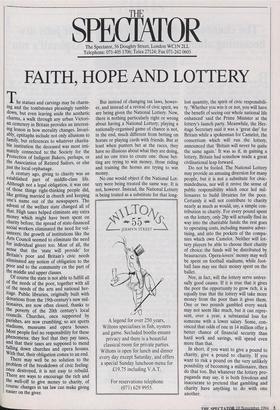THE
SPECTATOR
The Spectator, 56 Doughty Street, London WC1N 2LL Telephone: 071-405 1706; Telex 27124; Fax 071-242 0603
FAITH, HOPE AND LOTTERY
he statues and carvings may be charm- ing and the tombstones pleasingly tumble- down, but even leaving aside the aesthetic charms, a walk through any urban Victori- an cemetery in Britain provides an interest- ing lesson in how morality changes. Invari- ably, eptitaphs include not only allusions to family, but references to whatever charita- ble institution the deceased was most inti- mately connected to: the Society for the Protection of Indigent Bakers, perhaps, or the Association of Retired Sailors, or else just the local orphanage. A century ago, giving to charity was an established part of middle-class life. Although not a legal obligation, it was one of those things right-thinking people did, like getting married in church and keeping one's name out of the newspapers. The advent of the welfare state changed all of that. High taxes helped eliminate any extra money which might have been spent on charity before; the spread of state-financed social workers eliminated the need for vol- unteers; the growth of institutions like the Arts Council seemed to eliminate the need for individual givers too. Most of all, the sense that the 'state will provide' for Britain's poor and Britain's civic needs eliminated any notion of obligation to the Poor and to the community on the part of the middle and upper classes. Of course the state is not able to fulfill all of the needs of the poor, together with all of the needs of the arts and national her- itage. Public libraries, originally built with donations from the 19th-century's new mil- lionaires, are now often closed, thanks to the poverty of the 20th century's local Councils. Churches, once supported by parishes, are now crumbling; so are sports stadiums, museums and opera houses. Most people feel no responsibility for these phenomena: they feel that they pay taxes, and that their taxes are supposed to mend falling down churches and opera houses. With that, their obligation comes to an end. There may well be no solution to the Problem of the breakdown of civic feeling: once destroyed, it is not easy to rebuild. There are ways to encourage the rich and the well-off to give money to charity, of course: changes in tax law can make giving easier on the giver. But instead of changing tax laws, howev- er, and instead of a revival of civic spirit, we are being given the National Lottery. Now, there is nothing particularly right or wrong about having a National Lottery; playing a nationally-organised game of chance is not, in the end, much different from betting on horses or playing cards with friends. But at least when punters bet at the races, they have no illusions about what they are doing, and no one tries to create one: those bet- ting are trying to win money, those riding and training the horses are trying to win money.
No one would object if the National Lot- tery were being treated the same way. It is not, however. Instead, the National Lottery is being touted as a substitute for that long-
lost quantity, the spirit of civic responsibili- ty. 'Whether you win it or not, you will have the benefit of seeing our whole national life enhanced' said the Prime Minister at the lottery's launch party. Meanwhile, the Her- itage Secretary said it was a 'great day' for Britain while a spokesman for Camelot, the consortium which will run the lottery, announced that 'Britain will never be quite the same again.' It was as if, in gaining a lottery, Britain had somehow made a great civilisational leap forward.
Do not be fooled. The National Lottery may provide an amusing diversion for many people, but it is not a substitute for civic- mindedness, nor will it revive the sense of public responsibility which once led mil- lionaires to build librairies for the poor. Certainly it will not contribute to charity nearly as much as would, say, a simple con- tribution to charity. For every pound spent on the lottery, only 28p will actually find its way into the charitable funds: the rest goes to operating costs, including massive adver- tising, and into the pockets of the compa- nies which own Camelot. Neither will lot- tery players be able to choose their charity of choice: the funds will be distributed by beauracrats. Opera-lovers' money may well be spent on football stadiums, while foot- ball fans may see their money spent on the ballet.
Nor, in fact, will the lottery serve univer- sally good causes. If it is true that it gives the poor the opportunity to grow rich, it is equally true that the lottery will take more money from the poor than it gives them. One or two pounds gambled every week may not seem like much, but it can repre- sent, over a year, a substantial loss for someone with a lower salary. Some, con- vinced that odds of one in 14 million offer a better chance of financial security than hard work and savings, will spend even more than that.
In short, if you want to give a pound to charity, give a pound to charity. If you want to risk a pound on the very unlikely possibility of becoming a millionaire, then do that too. But whatever the lottery pro- paganda may say, it is both frivolous and inaccurate to pretend that gambling and charity have anything to do with one another.


















































































 Previous page
Previous page